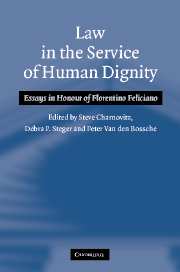Book contents
- Frontmatter
- Contents
- List of contributors
- Preface
- Biographical note
- List of abbreviations
- PART I Reflections on the contributions of Florentino Feliciano to international law
- PART II Insights into the World Trade Organization
- 5 Justice Feliciano and the WTO environmental cases: laying the foundations of a ‘constitutional jurisprudence’ with implications for developing countries
- 6 International trade law, human rights and theories of justice
- 7 Developing countries and the international trading system
- 8 North–South issues of foreign direct investments in the WTO: is there a middle-of-the-road approach?
- 9 The participation of developing countries in WTO dispute settlement and the role of the Advisory Centre on WTO Law
- 10 Reform of the WTO dispute settlement system: what to expect from the Doha Development Round?
- 11 Interpretation and Application of WTO Rules: Florentino Feliciano and the First Seven
- 12 Dispute settlement in the WTO: on the trail of a court
- 13 A proposal to introduce an Advocate General's position into WTO dispute settlement
- 14 Arbitration at the WTO: a terra incognita to be further explored
- 15 The challenges to the legitimacy of the WTO
- 16 The World Trade Organization after Cancún
- PART III The changing landscape of investment arbitration
- PART IV New challenges in international adjudication
- Bibliography of works by Florentino Feliciano
- Index
16 - The World Trade Organization after Cancún
from PART II - Insights into the World Trade Organization
Published online by Cambridge University Press: 29 July 2009
- Frontmatter
- Contents
- List of contributors
- Preface
- Biographical note
- List of abbreviations
- PART I Reflections on the contributions of Florentino Feliciano to international law
- PART II Insights into the World Trade Organization
- 5 Justice Feliciano and the WTO environmental cases: laying the foundations of a ‘constitutional jurisprudence’ with implications for developing countries
- 6 International trade law, human rights and theories of justice
- 7 Developing countries and the international trading system
- 8 North–South issues of foreign direct investments in the WTO: is there a middle-of-the-road approach?
- 9 The participation of developing countries in WTO dispute settlement and the role of the Advisory Centre on WTO Law
- 10 Reform of the WTO dispute settlement system: what to expect from the Doha Development Round?
- 11 Interpretation and Application of WTO Rules: Florentino Feliciano and the First Seven
- 12 Dispute settlement in the WTO: on the trail of a court
- 13 A proposal to introduce an Advocate General's position into WTO dispute settlement
- 14 Arbitration at the WTO: a terra incognita to be further explored
- 15 The challenges to the legitimacy of the WTO
- 16 The World Trade Organization after Cancún
- PART III The changing landscape of investment arbitration
- PART IV New challenges in international adjudication
- Bibliography of works by Florentino Feliciano
- Index
Summary
Introduction
The Fifth WTO Ministerial Conference, which was held in Cancún, Mexico in September 2003, ended without any achievement. It was the second fruitless Ministerial Conference since the establishment of the WTO. So far as this aftermath is concerned, some may take it as a victory of the developing countries and thus feel cheerful and encouraged, while others consider it as a foreboding of the WTO's collapse and feel depressed and worried. Some developed countries declared that they would offset the aftermath of the Cancún Conference through bilateral free trade agreements. So, why did the Cancún Conference fail? What are the effects of the failed Concun Conference upon the WTO, the developed countries, the developing countries, and economic globalization?
Issues and problems of the Cancún Conference
The Cancún Ministerial Conference was the follow-up of the Doha Round. Its main task was to carry out the Doha Declaration, which included the Singapore issues and the implementation of the Uruguay Round Agreements. The Singapore issues include trade and investment, trade and competition, government procurement, and trade facilitation. The implementation of the Uruguay Round Agreements involves many issues, among which the notable ones include trade in services, agricultural trade, intellectual property protection, and dispute settlement. So far as agricultural trade is concerned, the Doha Ministerial Declaration aims at ‘gradually reducing … with a view to phasing out, all forms of export subsidies, and substantial reductions in trade-distorting domestic support’.
- Type
- Chapter
- Information
- Law in the Service of Human DignityEssays in Honour of Florentino Feliciano, pp. 222 - 238Publisher: Cambridge University PressPrint publication year: 2005



